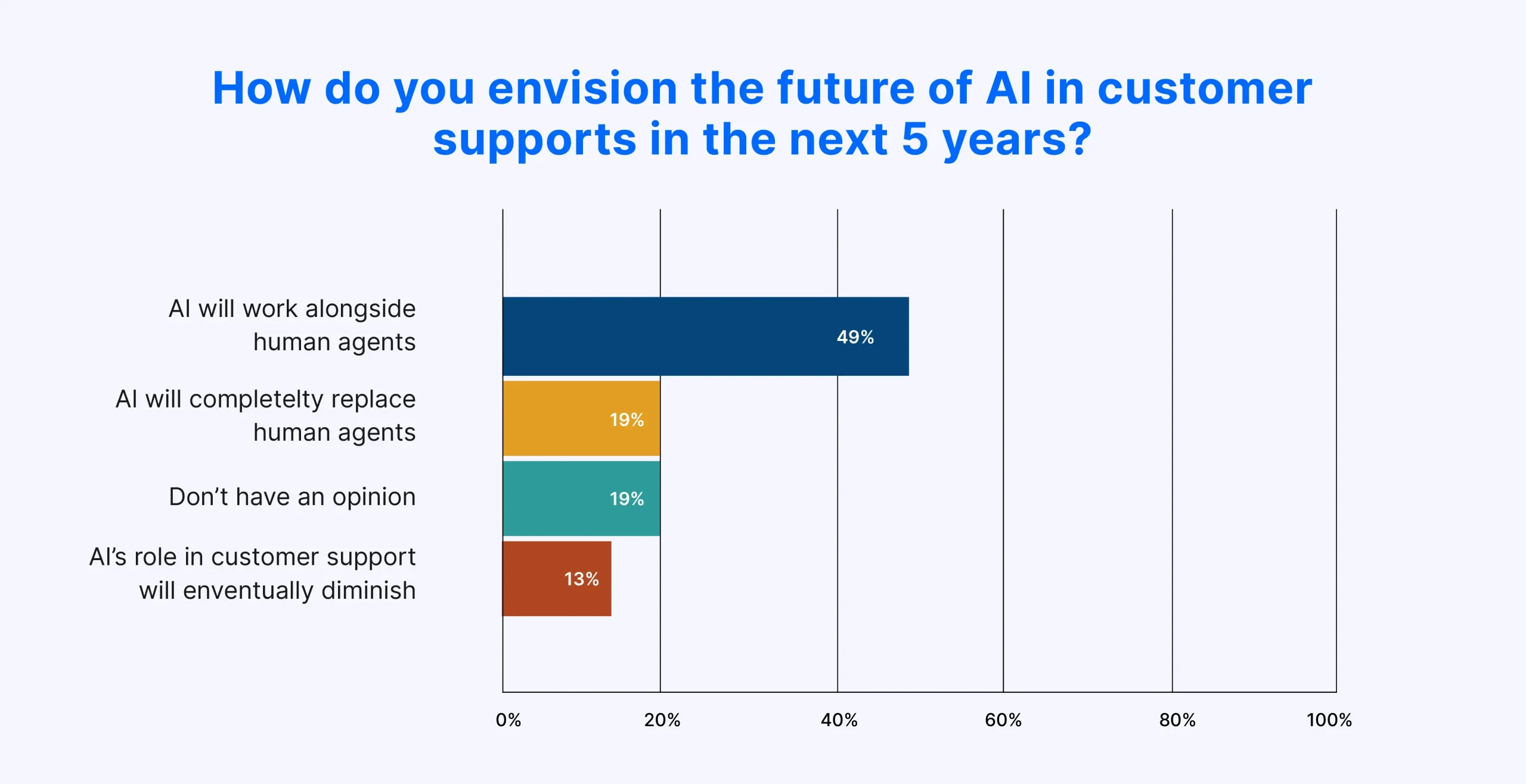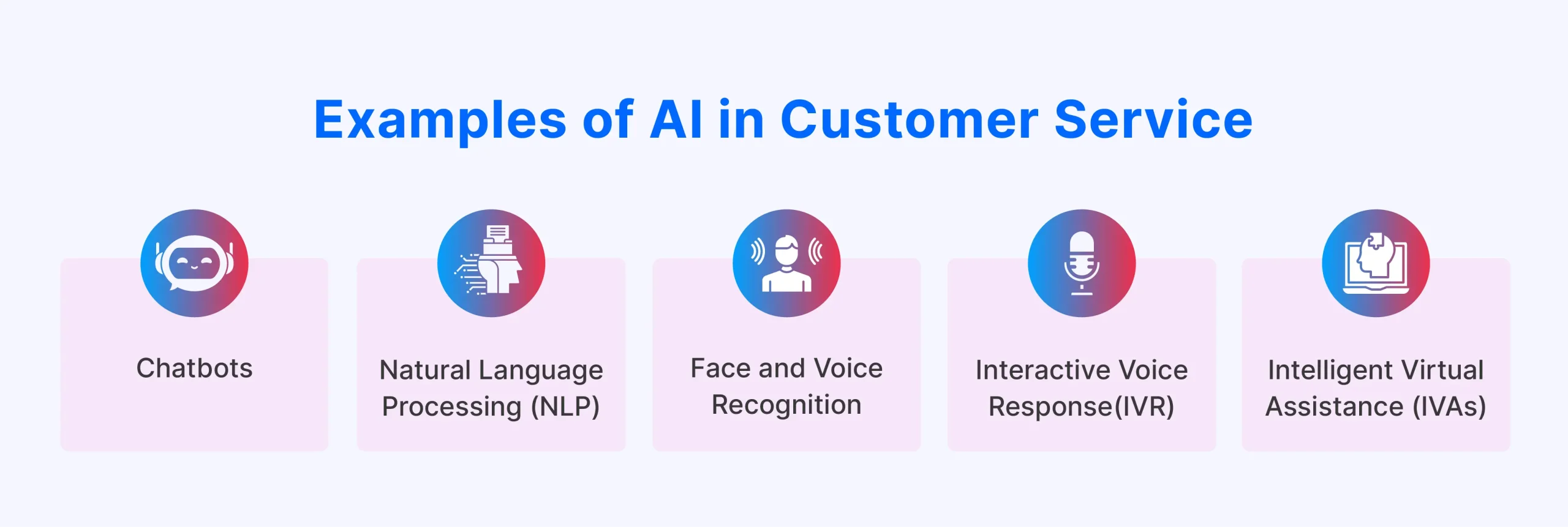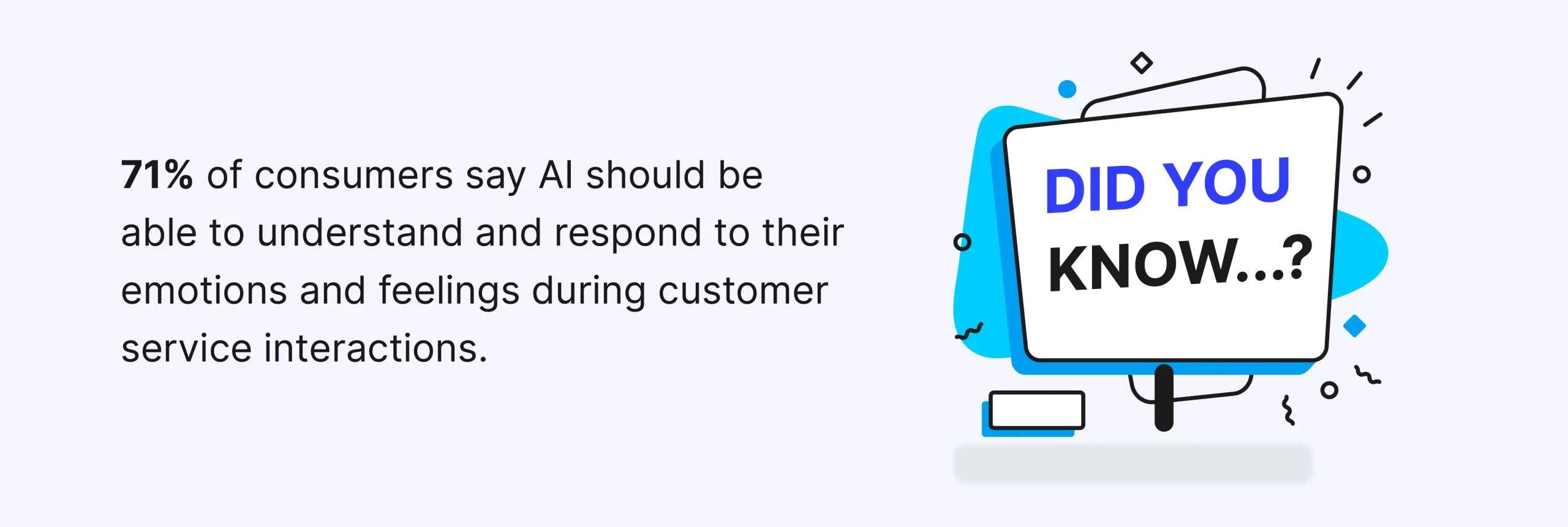When teams operate independently, it creates communication gaps that can lead to disorder. In contrast, when teams collaborate, they tend to be more efficient.
Traditional Customer service systems face numerous issues including a high volume of inquiries, overwhelmed staff, resource constraints, inconsistent service quality, limited availability, training and retention, repetitive tasks, data management and analysis, and customer expectations. But, companies using AI for customer service can easily address these challenges by automating repetitive tasks, providing 24/7 support, ensuring consistent service quality, and offering data-driven insights. AI powered customer service can help teams become more efficient, improve customer satisfaction, and adapt to the increasing demands of modern consumers. This shows how our everyday lives are changing due to technological advancements, which is why in this age of perpetual innovation, businesses need to think about long-term growth and model reinvention.
According to PWC 27th Annual Global Survey, 70% of CEOs said generative AI will significantly change the way their companies create, deliver and capture value in the next three years.
In this blog, you will learn the role of AI in customer service, the benefits of AI in customer service, some best tools for customer service, examples of AI in customer service and most importantly, how AI can improve customer experience in 12 ways.
AI customer service is about interactions between businesses and customers. AI for customer support works as a solution to traditional problems customer support team face. Integration of AI in customer service offer quick, efficient, and personalized solutions. A key trend is the shift towards a collaborative model where AI enhances human capabilities. A recent survey report revealed that 50% of customer support experts expect AI to work alongside humans, highlighting the growing need for AI in customer service.

AI customer care works by using machine learning algorithms, natural language processing, and other AI methodologies to understand, predict, and respond to customer needs. AI customer support bot can interpret large data volumes, including text and voice, and engage with customers in a human-like manner. Over time, these bots improve their responses, offering more accurate and relevant assistance. This way, Artificial Intelligence (AI) is revolutionizing customer success across industries, processing vast data and making intelligent decisions.
When companies integrate AI into customer service it enables numerous opportunities for businesses offering benefits for both businesses and their customers. Here are the key benefits:
The integration of AI and automation in customer support is revolutionizing the industry by enhancing efficiency, enhancing customer experiences, and reducing operational costs. Here are some of the examples:

Chatbots are a form of conversational AI designed to understand customer inquiries and provide automated responses in a friendly and engaging manner. They can handle a wide range of customer service tasks, from answering frequently asked questions to assisting with order processing and troubleshooting. Chatbots offer 24/7 availability, efficiency, and consistency in customer support. They can manage multiple conversations simultaneously, reducing wait times and improving satisfaction. They are commonly used in e-commerce websites for product inquiries, order status updates, and returns processing.
NLP is a branch of machine learning that enables computers to understand, interpret, and respond to human language. It can be used to process and analyze large volumes of text or voice data, making it a powerful tool for customer support. NLP enhances user experience by voice recognition commands and analyzing text, enabling automated responses to written inquiries and sentiment analysis to gauge customer satisfaction. For instance, customer support systems can automatically categorize and route support tickets based on message content.
Biometric AI technologies, such as face and voice recognition, use algorithms to detect and distinguish human facial features and voices. These technologies are primarily used for authentication and security purposes. Face and AI voice recognition technology enhances security by verifying a customer’s identity, ensuring personalized interactions. It also streamlines the user experience by eliminating the need for passwords or PINs, as seen in banks and financial institutions for secure transactions and account access.
IVR systems are automated phone systems that interact with callers, gather information, and route calls to the appropriate agents or departments. IVR systems can understand vocal replies and offer options for next steps. IVR systems offer benefits such as call routing, which reduces wait times and enhances customer satisfaction, and automated support, which handles routine inquiries like account balances or order statuses without human intervention, making them a popular choice for telecommunication comp
IVAs are AI programs that understand voice commands and perform tasks on behalf of customer support agents. They can handle a variety of customer service functions, from providing information to completing transactions. IVAs automate repetitive tasks, freeing up human agents for more complex issues. They use customer data to provide personalized assistance, enhancing the customer experience. Companies like Amazon and Google offer IVAs for product searches, recommendations, and order management via voice commands.
AI integration in customer service offers valuable insights into customer behavior, improved support processes, and stronger relationships. It can enhance customer success strategies by proactively addressing challenges and creating personalized interactions. This convergence fosters stronger relationships, streamlines support processes, and improves customer satisfaction. Here are 12 ways of how AI can improve customer service:
AI customer support bot is a powerful tool in modern customer service. It utilizes natural language processing and machine learning to respond to customer inquiries in real-time. These chatbots offer a more human-like, conversational approach, assisting with basic questions, website navigation, and troubleshooting common problems. For instance, if you are a telecom company, you can use an AI chatbot on your website and mobile app to guide customers through plan options without human intervention. To optimize the effectiveness of AI chatbots, integrate them with existing customer service databases and CRM systems. It allows the chatbot to access relevant customer data for personalized responses. However, regular updates and training of AI models with new data and customer interaction scenarios can further enhance the chatbot’s performance over time.

AI predictive analytics can predict customer needs and issues before they arise. This approach allows businesses to address potential issues, offer timely solutions, or tailor their services and products to meet anticipated needs. This analytic involves six levels of support, such as monitoring purchasing patterns and customer feedback.
For example, if you are a retail company, use AI analytics to monitor purchasing patterns and customer feedback, proactively contacting customers who recently purchased a product, offering installation guides or scheduling follow-up calls. You can effectively implement predictive customer service to focus on collecting and analyzing a wide range of data points, including transaction history, customer service interactions, and social media feedback. However, compliance with data protection regulations and regular revisiting and refining of predictive models are essential for maintaining customer trust and relevance in changing market conditions.
AI is revolutionizing Quality Management (QM) in customer service by enabling proactive identification of potential customer issues or dissatisfaction. By analyzing social media posts, online reviews, and customer feedback, AI can detect patterns and trends indicating customer dissatisfaction, allowing companies to address problems before they escalate. This improves the overall customer experience. In addition to sentiment analysis, AI based call centers will benefit from functionality that allows operational teams to understand customer interactions and underlying sentiment. Some AutoQA solutions also provide AI to assist analysts with scoring, enhancing efficiency and boosting confidence in the results. This shift in QM is expected to lead to a more comprehensive understanding of customer interactions and the underlying sentiment.
The CX Trends Report reveals that 59% of customers expect businesses to use their collected data to personalize their experiences. AI in customer service can leverage this data to provide personalized support, such as offering assistance based on previous behaviors, keeping customers updated on new products and services, sending discounts based on saved items, and serving in their preferred language. 60% of consumers find personalized recommendations valuable. An example of tool is Zendesk AI is built on customer intent models, allowing for rich, personalized conversations between customers and bots. This allows for an immersive customer experience and genuine empathy.
Artificial intelligence customer service can create intelligent workflows that provide faster support and efficient agents. AI can route requests based on customer intent, sentiment, language, agent capacity, agent status, and skill set. For instance, if a customer is charged a different price for a service add-on, the AI can understand their angry tone, account type, and billing information. It can then find a senior-level agent who can handle billing discrepancies and complete the handoff with customer context. This approach eliminates wait times and improves overall customer experience.
AI in customer service is revolutionizing global customer support by enabling businesses to provide assistance in multiple languages without the need for multilingual staff. This technology uses advanced natural language processing to accurately translate customer queries and responses in real-time, ensuring seamless communication regardless of language barriers. For example, an e-commerce platform with a Japanese customer can have their query translated into English for the support team, and back into Japanese for the customer. This seamless process ensures effective communication and a satisfactory customer service experience. To enhance the effectiveness of real-time translation, businesses should choose a system that understands cultural nuances and colloquialisms, regularly update and train the AI with new languages and dialects, and integrate a feedback mechanism for continuous improvement.
AI for customer service can help manage high-volume customer interactions, a challenge faced by businesses during peak hours or seasonal events. Its ability to process and respond to multiple queries simultaneously ensures prompt and high-quality service even under pressure. For example, an airline company can handle thousands of interactions simultaneously during the holiday season by deploying AI systems capable of handling thousands of interactions simultaneously. The AI system sorts queries, responds to common questions like baggage allowances or flight status, and escalates complex issues to human agents, reducing wait times and freeing up human agents to focus on more important tasks. To maximize AI’s effectiveness, businesses should have a well-structured categorization system, regularly train the system with updated information and scenarios, and ensure a seamless handoff process for queries that require a more personal touch or are too complex for AI to handle.
AI based shopping assistants uses artificial intelligence to analyze and understand customer interactions at various touchpoints. This process involves collecting and interpreting data from multiple channels to create a detailed map of the customer’s experience, from initial contact to post-purchase support. AI algorithms can identify patterns, pain points, and opportunities for enhancement throughout the customer journey, enabling businesses to optimize interactions and improve the overall customer experience. For example, an online retailer uses AI to track customer interactions across their website, customer service channels, and social media platforms. The AI can identify customer drop-off points due to unclear shipping options, simplifying the checkout process. This in result reduces cart abandonment and increasing sales.
AI integration with multichannel support enables a seamless service experience across various channels, such as email, social media, live chat, and phone calls. This helps in synchronizing information and interactions, ensuring personalized and coherent support for customers. For example, a consumer electronics company can use AI integration to provide immediate access to email history when a customer calls the support number, eliminating the need for repeating information. To successfully integrate AI with multichannel support, the AI system should have access to a unified customer database that consolidates information from all channels, updated in real-time.
AI virtual assistants in customer service can assist with agent onboarding and training. It can make it easier for new hires to learn and improve their customer service skills. The advanced AI helps agents handle more complex requests through intelligent routing and suggests the next course of action in a given scenario. An example scenario is a newly hired agent who is still getting comfortable handling live customer service requests. The bot offers relevant help center articles and suggested responses to help the agent learn the ropes faster.
AI advanced bots have pre-trained customer intent models that can address industry-specific customer issues based on customer service data. These bots can automatically identify customer intent and classify requests, offering personalized, accurate responses. They can share the intent with agents for context. These bots can be deployed on messaging and email channels to deflect customer questions and handle repetitive tasks, allowing agents to focus on human-touched queries. Instead of spending hours manually configuring chatbots, setting up an advanced bot is a few simple clicks. For example, an advanced bot can respond to a customer’s Instagram DM stating their order was never delivered, offering a replacement or refund.
Different AI tools for customer service are being used to automate email responses using Natural Language Processing (NLP) and Machine Learning (ML). Agents can access a widget embedded in their help desk software to display the correct answer to customer inquiries. For example, Freshdesk’s Freddy AI smart assistant offers suggested responses based on ticket text, allowing agents to respond faster to multiple customers without repeatedly typing the same responses. This eliminates the need for agents to repeatedly type the same responses.
Gartner predicts that by 2026, conversational artificial intelligence (CAI) deployments in contact centers will reduce agent labor costs by $80 billion. With around 17 million agents worldwide, many organizations face staff shortages and labor expenses, which can represent up to 95% of contact center costs. AI can improve efficiency and customer experience by making agents more effective. Gartner also projects that one in 10 agent interactions will be automated by 2026, an increase from 1.6% of current interactions. Conversational AI can automate all or part of a contact center customer interaction through voice and digital channels, such as voicebots or chatbots. AI is expected to have transformational benefits for customer service and support organizations within two years. AI-powered analytics and predictive modeling enable businesses to analyze customer data, identify patterns, and proactively address customer needs. This personalization enhances customer satisfaction and loyalty.
Have a look at this impact radar 2024 from Gartner. It highlights key technologies poised to transform customer support within the next few years.
Generative AI and intelligent applications, expected to make an impact now and within the next 1 to 3 years, will enhance customer service through advanced chatbots, virtual assistants, and personalized interactions. Privacy-enhancing technologies and human-centered AI, crucial for maintaining data integrity and empathetic communication, will also be pivotal. Additionally, behavioral analytics and GenAI-enabled virtual assistants will enable proactive and efficient customer support. These advancements will collectively improve customer satisfaction, streamline operations, and reduce costs for businesses.
Level up your customer interactions with IntellicoWorks AI chatbot development services. At IntellicoWorks, we customize chatbots to provide seamless support, personalized recommendations, and 24/7 assistance, transforming customer engagement. Our team of AI experts knows how to leverage the right technologies like natural language processing (NLP) according to client needs. We develop chatbots that deliver human-like interactions, while task automation frees up valuable resources by handling routine inquiries and tasks efficiently. With multichannel integration, meet your customers wherever they are on your website, mobile app, or social media.
The adoption of AI and automation in customer support is revolutionizing every industry. A real life example of Chris Duffey who is Adobe’s enterprise generative AI authority emphasized the necessity for businesses to reinvent themselves in response to emerging customer expectations and technological disruptions. He highlighted the increasing importance of customer centricity, urging businesses to design immersive AI journeys that create deeper connections with customers.
The real-life business success of Adobe using AI to improve customer service by analyzing customer emotions, enhancing satisfaction, and addressing concerns. The company’s AI-driven tools can analyze social media interactions and customer feedback to adjust marketing strategies, aligning with customer needs and expectations. This approach drives deeper connections and loyalty, demonstrating the importance of reinventing businesses to meet evolving customer demands.
Thus, AI in customer service provides significant benefits in terms of efficiency, scalability, and customer satisfaction. By leveraging these technologies, you can be the next adobe in the industry. Why wait? You as a Business can also offer enhanced, personalized, and secure customer experiences with AI chatbot development.
Experience the future of customer service with IntelliCoWorks, where innovation meets excellence.
Transform Your Business with Custom AI Chatbot Solutions!

Talk to us and let’s build something great together
A Subsidiary of Vaival Technologies, LLC
IntelliCoworks is a leading DevOps, SecOps and DataOps service provider and specializes in delivering tailored solutions using the latest technologies to serve various industries. Our DevOps engineers help companies with the endless process of securing both data and operations.
Ops
Cloud
AI & ML
Copyrights © 2023 byIntellicoworks. All rights reserved.